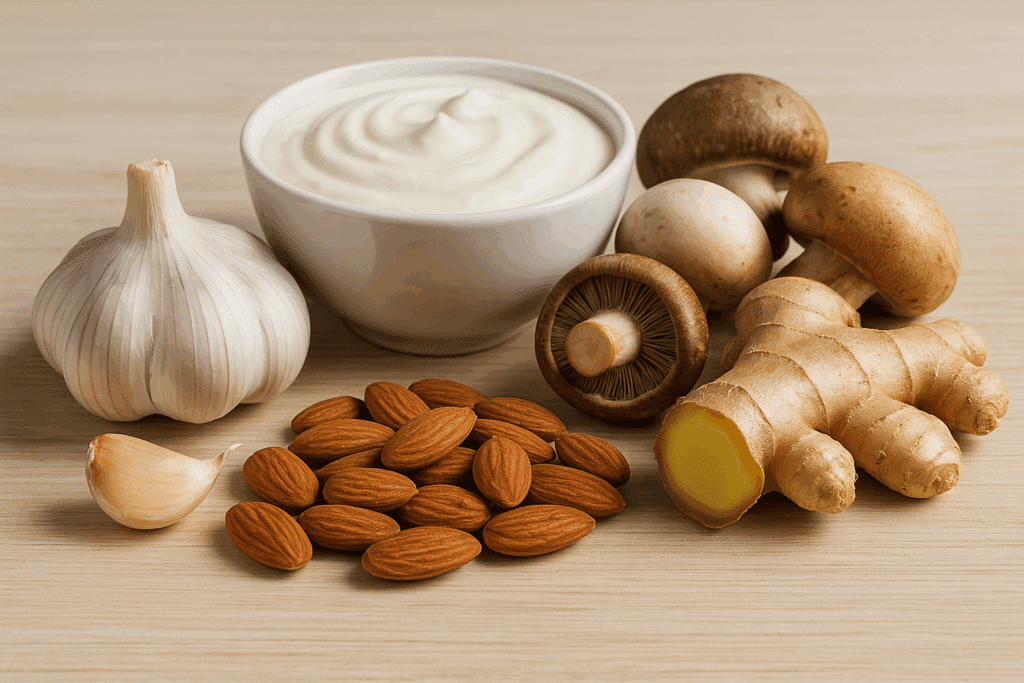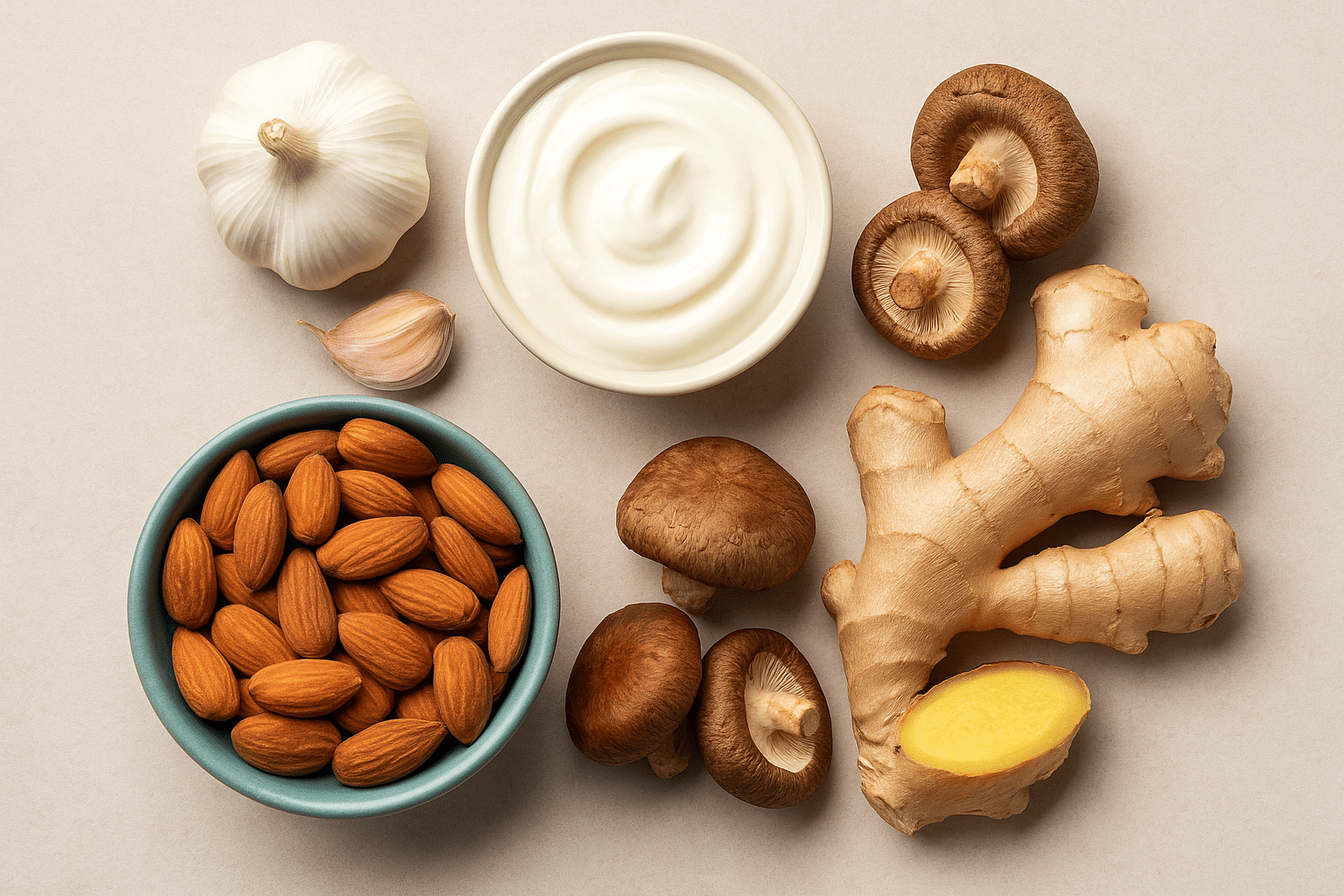
Since the corona pandemic, there has been a lot of focus on our resistance and how to best support your immune system. Every day your body is exposed to pathogens and your immune system is vital to protect you. The most important factor contributing to an optimally functioning resistance is nutrition. Below you can read which 5 types of food can help well.
With nutrition, you can do a lot to support your resistance. Of course, it is important anyway to choose fresh fruits and vegetables and avoid alcohol, sugar and processed foods, for example, as much as possible. These can even interfere with the functioning of the immune system.
These top 5 foods for resistance include different types of foods that contain substances important for intestinal flora, the immune system or are rich in antioxidants, vitamins or probiotics. See highlighted types of nutrition below:
Garlic was recommended in ancient times by Hippocrates, who prescribed it for various ailments. In the Journal of Nutrition, the article Historical Perspective on the Use of Garlic, that remains of garlic were found in the Egyptian pyramids and Greek temples. Greek athletes who had to perform in the early Olympic Games were given garlic, perhaps as a very ancient form of performance-enhancing supplements.
Much research has been done on the effects of garlic on resistance. A review (Immunomodulation and anti-inflammatory effects of garlic compounds) on PubMed states that it contains the substance allicin, which has antimicrobial properties and can help kill microorganisms that can cause infections. Garlic may also potentially help improve immune system function.
It does this by stimulating immune cells and regulating cytokine release, immunoglobulin production and phagocytosis. Add garlic to salads, soups or stir-fries to easily get more of this flavoring.
Did you know that 70% of your resistance is in your gut? This is also why nutrition is so important in supporting your resistance. The microbiome plays a big role in this and it needs good nutrition to function.
Fermented foods such as yogurt are rich in enzymes and probiotics needed for healthy digestion. If your gut (and microbiome) is balanced, it will help control harmful bacteria and support your overall health.
Dairy products such as yogurt and kefir are good sources of pre- and probiotics. Eat these products naturally as much as possible and prefer to leave out flavored and sweetened varieties.

Mushrooms should also not be missing from the list of healthy foods for your resistance. They contain minerals, antioxidants and polysaccharides such as beta glucans. These have a powerful supporting effect on the immune system. Thus, they can help stimulate the production of protective immune cells and support more effective immune system function.
Many medicinal mushrooms contain various antiviral, antifungal and antibacterial compounds. This is also reflected in the comprehensive review Immune Modulation From Five Major Mushrooms: Application to Integrative Oncology published on PubMed in 2014. Below we list the most important mushrooms for the immune system:
In an study in China, the effectiveness of Chaga was tested against the Herpes simplex virus (HSV). An extract of Chaga caused a striking decrease in the virus. It worked especially in the early stages of infection. It prevents the virus from entering the cell by preventing the virus from fusing with the cell wall. It does this by acting on certain proteins (glycoproteins) of the virus.
Those looking for even more healthy foods that can help support the immune system can start eating more nuts, especially almonds. These are a good source of minerals such as magnesium, manganese, calcium, iron and zinc. They also contain vitamins, such as vitamin B6 and E. All of these substances are important for resistance, helping to regulate and maintain it.
Almonds also contain many healthy fats. Vitamin E is additionally a powerful antioxidant that stimulates the body to produce more T cells. And these cells can directly kill cells infected with a virus or bacteria. Eat almonds especially still with the skin around them, as research seems to show that they contain substances that are good for the immune system.
If you like ginger, then you’re in the right place. Ginger is a spice with powerful anti-inflammatory and antioxidant properties. There is evidence that certain constituents in ginger may have antiviral properties, although more research is needed on their practical applicability in humans. One of the special substances in ginger, gingerol, has antimicrobial properties.
You can easily get all these foods by eating or drinking them daily. Fresh produce is always good; the body can easily absorb the substances. Sometimes a supplement can also be helpful. For example, in a webshop you can buy capsules of a medicinal mushroom purchase or a supplement containing ginger. Always make sure you buy from a reputable shop and that the supplement contains as few useless additives as possible.
If you have health problems or are hypersensitive to certain nutrients, be careful with supplements. This is especially true if you are sensitive to mushrooms, do not use them in cooking or as a supplement. Get advice from your doctor on whether certain foods or supplements are appropriate in your situation. Always stick to the recommended dosage and stop using any supplement or product if you find that you react sensitively to it.
This blog is intended as a source of information; it is not medical advice



Valid from Oct 21 to Nov 2, 2025
Use the code below at checkout to receive 15% off your entire order.

